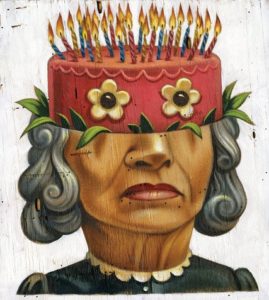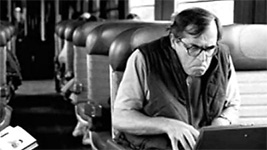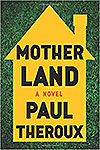Stephen King takes on Paul Theroux (Malawi)

MOTHER LAND
By Paul Theroux (Malawi 1963-65)
509 pages
An Eamon Dolan Book/ Houghton Mifflin Harcourt
$28.00
Reviewed by Stephen King
New York Times — May 9, 2017
At the outset of this long slog, the narrator, J P (Jay) Justus, passes on a story his mother told him as a child, with a smile and a nod of satisfaction. Once upon a time there was a man condemned to be hanged. As a last request, he asked for a word with his mother. She was taken to the foot of the gallows, where he stood handcuffed. Instead of speaking to her, he bit off a piece of her ear, spat it out and screamed, “You are the reason I’m here, about to die!”
What follows this fable are 500 or so pages in which Justus bites not only his mother’s ear but those of six siblings. Only the seventh, Angela, is largely spared, and for good reason: She’s been dead for over 40 years. That’s a lot of ear-biting, and by the end of this exercise in self-regarding arrogance and self-pity, the reader may feel that his own ear has been savaged.
All self-educated readers (that would be most of us) have holes in our curriculum vitae, and I’m no different. I’ve read Dickens and Tolstoy but not Austen; most of Faulkner but little of Hemingway (and regretted what I did); all of Philip Roth, but none of Saul Bellow. Paul Theroux was one of my holes, a prolific writer I had always meant to get around to. Now that I have, I’m not exactly sorry, but I’m certainly gobsmacked, and although I knew next to nothing about Theroux’s life, by the time I’d read the first 100 or so pages of “Mother Land,” I began to suspect that what I was reading was not so much a novel as a kind of masked autobiography. Accordingly, I went to the internet to check for similarities.

Stephen King and friend
Jay Justus is a writer primarily known for his travel books. So is Theroux. Jay has been twice married and divorced. Theroux is divorced and remarried. Both come from large and rancorous families, both were Boy Scouts, both had salesman fathers, both had mothers who lived past 100 years of age, both were raised in Massachusetts, from which they often leave but invariably return. And, I discovered, this is hardly the first time Theroux has strip-mined his family, not to mention some of his own previously published material. Hardly a new thing in the world of letters, but one rarely comes across such parallels coupled with such a savage appraisal.
And still, I sort of liked it. As with some of the more gruesome Thomas Hardy novels (“Jude the Obscure” comes to mind), reading “Mother Land” is like watching a slow-motion car crash. As I trudged my way through Jay’s long-winded jeremiad about his belittling, cozening, lying, scheming mother (who is never named; she’s just Mother) and his backbiting, gossiping, unpleasant siblings, I repeatedly found myself thinking about the old joke that goes, “Other than that, Mrs. Lincoln, how did you enjoy the play?” This led me to consider the fine line between humor and horror: It stops being funny when it starts being you.
There’s no story here, really, just a situation: Mother sits on her throne (a leather chair in the living room), carves birds, does crosswords and boasts about her good health. “What am I awn?” she asks when her children are comparing their various drug treatments. “I’m not awn anything.” And she’s a genius at playing favorites. “We were most loyal to Mother when we were being disloyal to each other,” Jay writes. “Mother feasted on failure.” He refers to her children as a savage tribe worshiping a goddess. They bring her gifts, but always separately, so they don’t have to run into one another. “She was propitiated with presents.”
Theroux can tell a story when not occupied with his narrator’s need to enumerate old hurts and settle old scores. One of the best has to do with his henpecked shoe-salesman father, who briefly frees himself from his wife’s suffocating influence by taking the part of Mr. Bones in a minstrel show. During the rehearsals, he becomes a different man, amusing and vaguely sinister. “Swanking in the role of a comical slave,” Jay writes, “he’d become a frightening master to us.” The Mr. Bones tale was new to me, but will be familiar to many Theroux readers, as it has previously appeared in both The New Yorker and Theroux’s short story collection of the same name.
The story of Jay’s older brother Floyd’s bedwetting is less funny (that fine line between humor and horror). “Years later he still spoke of it with bitterness and shame.” He’d been “terrified in anticipation of Mother’s screech. ‘Again! You’ve done it again!’ ” Eventually, she makes Floyd sleep on a rubber sheet.
Anything Jay says in “Mother Land” is worth saying at least twice (or a dozen times), and one of these repetitions has to do with what he sees as his family’s uniqueness: “I never saw … any group of people as tangled, as rancorous, as my own family.” Yet many of us will surely feel empathy rather than horror when Mother threatens Floyd, declaring she’ll “hang that rubber sheet around your neck” and make him “wear it to school.” Most adults, your reviewer included, can remember similar shamings from parents who have simply reached the end of their rope. Philip Larkin more succinctly knew how they screw you up, “your mum and dad. They may not mean to, but they do.” I was reminded of my wife’s grandmother, watching me with gimlet eyes as I — then a very young man — staggered into her house with a load of luggage and baby paraphernalia. “If you stuck a broom up your bottom,” she helpfully informed me, “you could sweep the floor as you go.”
Floyd the Bedwetter (even in his 60s, afflicted with other assorted ailments, his brothers and sisters never let him forget his childhood failing) grows up to be a university professor, a poet and a sometime critic. Upholding the family tradition of hostility, he agrees to review one of his brother Jay’s novels for Boston magazine and trashes it: “At best a beach read, a middlebrow brick just a step above Judith Krantz or Belva Plain… a bizzare chiasmus, a Rumplestiltskin prank,” its author a “name-promoting, self-absorbed” hack. And so on and so forth, blah, blah, blah. All of this seemingly in revenge for Jay’s failure to tell him that Jay had become seriously involved with a woman and had offered her a commitment ring.
“Mother Land” is an exercise in mean-spirited score-settling. It’s also fun. The party to celebrate Mother’s 90th birthday is only amusing, but the clambake in the assisted living facility where she celebrates her 102nd is downright hilarious, with the elderly children still sniping at one another in grammar-school argot. When Jay arrives for the festivities, one of them exclaims, “It’s doo-doo head.”

Paul Theroux writing
Theroux possesses a fabulously nasty sense of humor, at its best when Jay is describing Mother’s execrable cooking: ”Everything Mother made looked like cat food, including the mittens she knitted, so her gifts were all a form of mockery.” Even better — I’m laughing as I write it — is his description of Mother’s pea soup, “so thick a mouse could have trotted across it.”
Is style enough? Shall we read this Bible-size rant for its prose? The reader must decide for him- or herself. As for me, I enjoyed “Mother Land” against my will. Jay’s family is far from unique, and a version of his cozening, calculating mother can be found in many homes, but I also found a little bit of myself here. Theroux ends up assassinating all of his characters, but I still enjoyed the play.
Stephen King’s novel “Sleeping Beauties,” written with his son Owen King, will be published in September.
•
 Mother Land: A Novel
Mother Land: A Novel
by Paul Theroux (Malawi 1963–65)
Eamon Dolan/Houghton Mifflin Harcourt
May 2017
528 pages
$28.00 (hardcover), $15.99 (Kindle)
King reviewing Theroux is like a McDonalds connoisseur reviewing haute cuisine. Why did he do this at all? Must have an ax to grind against literary types who will NEVER consider him a good writer. He doesn’t need to review anyone for the $500 the NYTimes pays. He chose to do this.
I haven’t read Stephen King and don’t intend to but where exactly does he think that most authors get their ideas from? For a travel, non-fiction author it’s often something he’s seen or experienced or heard about–in Theroux’s case–while traveling the world. One of the advantages RPCV’s like Theroux have is the broad, cross cultural experiences they can tap into in so many ways to write fiction or non-fiction. And the more we suffer, get lost or are frustrated things–the better.
I’m not a Stephen King fan, and actually avoid his work. It’s simply not my thing. But one of his books, “On Writing,” I have read. For writers, no matter their genre, it’s a respected go-to. And a bit of an autobiography of sorts. For this reason, I was pleased to see his review of Theroux. King knows a good writer when he sees one.
Stephen King says that Paul Theroux’s book is deeply unpleasant — but he ended up liking the book. My own attempts at reading Theroux have ended with my grudging acknowledgement that he’s a helluva writer but far too self-involved for my taste. His narrators always seem to be showing off as being the smartest people in the room — and everyone else is kind of stupid. How about having some humility? How about writing about someone you admire — other than yourself? It looks like Stephen King saw those same qualities in Theroux’s latest — but he came out liking it … on balance.
A propos of King’s remarks about holes in our reading history — I’ve never read any of Stephen King’s novels.
Stephen King gives voice to the love-hate relationship so many writers have with Paul Theroux. My own case is a bit more complicated: I love Theroux’s work; my wife hates it!
I’ve been in love with Paul Theroux for decades, since I read his first fabulous travel books. I mean in love with him, as well as his books! When he came to the Miami Book Fair a long time ago I volunteered to pick him up at the airport, but someone else beat me to it. Being in a car with Theroux was a fulminating fantasy. I hung on his every word, written with passion and great humor. (Watching an Indian shit beside a train track — now I know why they call it the “turd world.” ) “Deep South” is his last book that I read and shared with a book club who didn’t know what I knew about him, his past, the iteration of his inimitable writing style (though rather poorly edited, I was sad to see). He took me down another road again, as he did with his article on the Mexican border in, I believe, the Smithsonian Magazine. He always has unique perspectives that open my eyes to see what he sees,
Who cares what Stephen King thinks about him.
I’m waiting for Paul to call and ask me to pick him up at the airport!
Leita Kaldi Davis
I went to hear Paul give a book talk at a local library here a few years ago on Cape Cod where we both live. As with all famous authors whom I habitually bug to read and review one of my works of fiction, I asked him if he would read my “Peace Corps” novel, which, as noted in the Peace Corps Writers review it once received is “…not a Peace Corps novel…” He said he might after the others he was presently reading. We also discussed our peace Corps experiences in Africa, and, wonderfully, like all conversations with RPCV, we were momentarily equals on the same plain, each genuinely reliving the permanently-etched-in-our-psyche-experience. Not a world famous author talking to a self-publishing scribbler. I doubt I could have had this experience with Stephen.